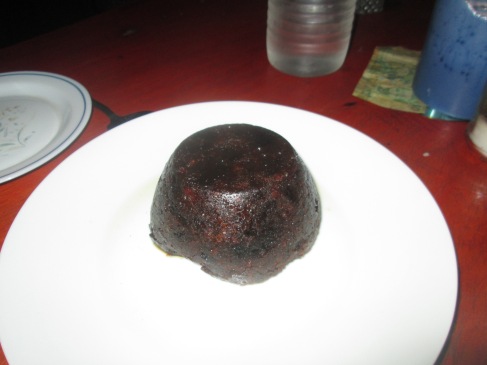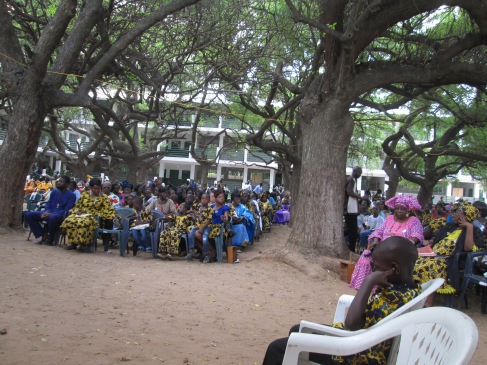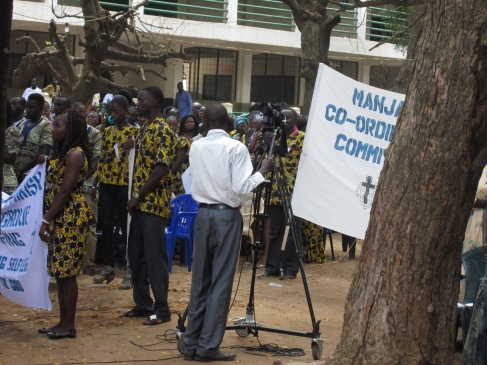In mid-November I updated my iPod to start playing Christmas tunes, at first occasionally popping up on shuffle but then with a dedicated playlist. I have often heard “oh, it doesn’t feel like Christmas when it’s warm” from those who’ve spent it abroad and wondered if that was true. Does it really take a robin bob-bob-bobbin through the snow to feel like Christmas? Certain charity pop songs have it that, what with poverty, “the burning sun” and the “bitter sting of tears” it is particularly difficult to appreciate the season of goodwill in a very poor African country. As my birthday falls on Christmas Eve experimenting with the presence of the Christmas spirit was a bit of a high risk gamble but we can but try.
When people say “it doesn’t feel like Christmas” they mean the atmosphere. So what makes Christmas?
Religion
Though for not all, Christmas is first and foremost a religious feast. Even some of those who wouldn’t dream of making church a feature of a normal Sunday morning think getting to a church at Christmas is part of the season. Of course, my church prepared in the way prescribed under canon law, and the practice of Advent with purple and pink candles lit around a wreath each week, sermons about preparation and meetings about the liturgical accuracy of various elements. For years I have celebrated my birthday on 23rd (Birthday Eve) so that friends and family can attend the vigil Mass. This year I had to shut down my birthday party early so that Mags and I could get to church in time for carols. We were at church from 9 until 1am. Decorations had been added, the crib was out and weirdly contained a stuffed donkey, a camel with a missing leg and models of various shapes so that “baby” Jesus was over twice as big as his mother. Religious Christmas was fully ticked.

Music
For me, like many of my friends, as a life-long chorister music is essential. My sister Katharine will generally sleep an extra five hours on Christmas day after a month in which her five choirs are all performing to the best of their abilities, often with three concerts in a day. New music is learnt and descants are polished until they sparkle. And so, was there music? Well yes. In September as ever I was learning a few new Christmas tunes, singing “waaw, tey la Noel” (“yes, today is Christmas”) into the humid rainy season air. I myself was teaching “Gaudete” and “The Angel Gabriel” and allocating solos and pointing out the music in the book for “O Come, O Come Emmanuel” which had, until then, been passed on by ear. I had a visitor to the choir and had to wear the dreaded asobi again, managing to give Mags a shorter version which made her feel like Sister Mary Roberts, the novice in Sister Act. There was the predictable last minute switching of a solo and the under-prepared soprano ‘star’ messing it up to be out sung by me with the correct pitches in the choral sections. The addition of a competing soloist row definitely made it Christmassy music wise.

Family
Christmas is a time of friends and family and it is this that is obviously the hardest to make up for when away from home. I luckily had a sister to stay, bringing traditions and presents from afar, like the original gifts symbols of something intangible about who I am to them and they are to me. We opened gifts on Christmas morning, sang along to the Muppet Christmas Carol and ate bacon butties. It was ever thus. Yet even without Mags, I had the family spirit around me. I had been invited for Christmas lunch in October, I had small stocking like gifts for those who have cared for me this year, sweets and balloons, reading books and colouring pencils for the children and cake, photos and wine for the adults. We visited the Assine family, ate there, then rushed to the original invitation with Auntie Cor, ate again (oh yes, we ate too much in seasonal style) then on to the Mendys for a quick greeting. We missed the VSO party because it was in the afternoon and we had too many families to visit, and instead we went to a traditional Christmas day masquerade. Eventually we got home and, with our first glass of wine of the day, skyped Dad and Katharine and had a stilted chat. There was so much family that too many were missed (Gran and Grandad, Mum, Irene, this especially means you). So far, so Christmassy.

Parties
I love parties at Christmas. Everyone is looking forward to them and in the mood for some good cheer. Christmas parties almost organise themselves. And my birthday is amongst the best. For years I have had a dinner with select friends but my 30th topped that off in spectacular style. I wanted a change so had a house party. Mum sent a Birthday present of cash to pay for food and drink, and a new dress. Mags toiled in the kitchen, Natalie circulated and pitched in, I meandered around feeling glamorous. So many people came and I was thrilled. By Boxing Day another party was in full flow, this time a beach BBQ. We played touch rugby and swam in the sea before breaking off some cake, pouring a good whisky and watching the sunset as green phosphorescence lit up the ocean waves.

Decorations
Do they know it’s Christmas? I think the power bill of my local supermarket must have doubled. It’s covered in lights, there’s tinsel on every surface and every window I covered with plastic friezes of Father Christmas and snowmen and stars and trees. Every Christian house you visit has balloons on the ceiling, foil garlands hanging overhead and shining baubles around the place. Decorations are not a problem. Mine seem very tame in comparison, despite one VSO who was amazed at seeing tinsel on my dining table. Even the VSO Christmas party had a tree and various shiny things, collected by VSOs gone by to add festive cheer.

Weather
Ok, so it is hot and sandy and you can go out without a coat. But if the cold, rainy or snowy weather that makes you want to be inside in the warm was the only thing that made Christmas it’d be Christmas in Manchester on at least 178 days every year. And this year we got to swim in the sea, is there a better Christmas present?

Christmas is what you make it. If you see it as a festival of hope and light in a dark world, why would your poverty stop you celebrating? Poverty doesn’t stop people being human, though it severely and cripplingly limits how you can express that humanity. For one day, your faith says “there is something different” and, for Catholics at least, people should be working to make that difference every day. But to wish well for others, to save what you have and do something to mark a time that is special to you through your faith or family, everyone knows what that is. And it’s not the weather that stops it feeling like Christmas, it’s forgetting how to hope and work for the best, not being happy that you are alive, and failing to celebrate being human together. None of that was missing in my Christmas. But knowing that another Christmas is here, with the promise of change for a more equal society but that it’s a promise still unfulfilled from last year, well, that is what makes us try to make a difference every day.
* Thanks to Natalie Smith for a few of the photos

























